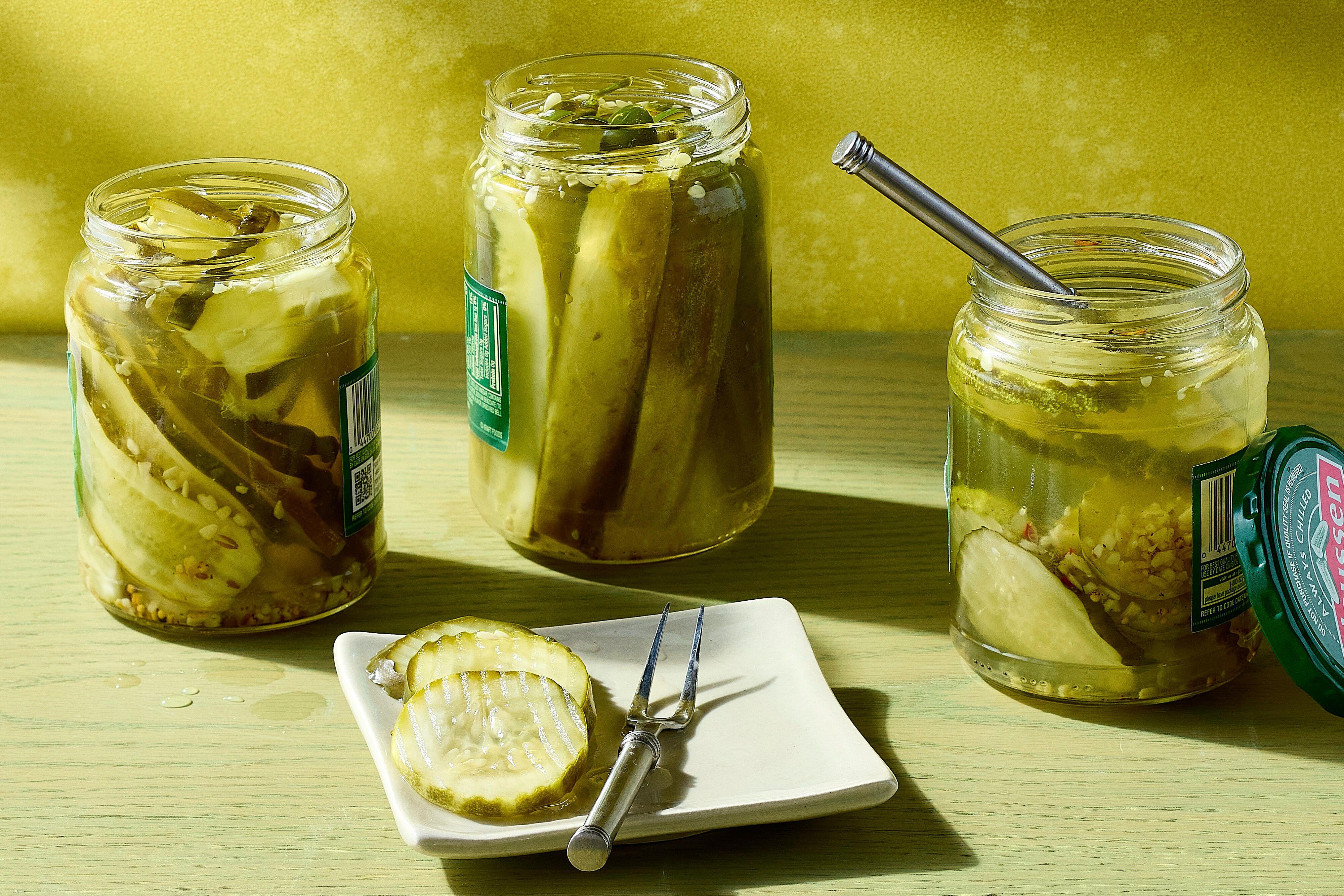Whether we’re using them to top pizza or burgers, adding their brine to cocktails, or just popping open a jar to snack on, we can’t get enough of pickles. But if you don’t find yourself reaching for pickles quite that often, you might have a jar (or two) hiding in the back of your pantry or fridge. Are those pickles still safe to eat? And how much longer will they last?
We asked Jamie Baham, MS, RDN, LD, owner of Ladybug Nutrition in Oklahoma City, Oklahoma, to weigh in. Here, she cracks the code on whether or not pickles go bad, how to store them, and when it’s time to toss them.
Jamie Baham, MS, RDN, LD, owner of Ladybug Nutrition
Do Pickles Go Bad?
Pickles are made by preserving fresh cucumbers in a brine that’s usually made with water, vinegar, and spices. By their very nature, pickles typically have a long shelf life—an unopened jar of store-bought pickles can last years beyond its best-by date and, once opened, will still last up to 3 months when properly stored. Homemade pickles won’t last quite as long, depending on how they’re made. Pickles canned with a water bath can last up to a year unopened, while quick pickles that aren’t heat-processed will only last a few weeks.
“Store-bought pickles generally have to undergo vacuum sealing and have to use a specific brine strength for preservation, while homemade pickles are more varied and may have lower brine salt solutions, which will cause the pickles to soften faster and expedite microbial growth,” Baham says.
So, while pickles may seem like they last forever, they can definitely go bad under certain conditions.
“Pickles can go bad if the pH is lowered and there is not enough salt,” Baham says. “The key factor to reduce spoilage is low pH and high salt, especially when they have been exposed to oxygen (like in the case of an improperly sealed jar).”
Try MyRecipes, our digital recipe box to stash and organize all your favorite Better Homes & Gardens recipes.
How to Store Pickles
To avoid your pickles going bad, following proper storage guidelines is essential. Store-bought and heat-processed homemade pickles (like those canned in a water bath) can stay at room temperature until the jar is opened, but homemade quick pickles (also called refrigerator pickles) must be stored in the refrigerator. Once opened, all pickles should be stored in the refrigerator in a tightly sealed jar to reduce their exposure to oxygen.
“Cold temperatures are essential for slowing microbial growth,” Baham says. “Keeping the pickles in temps below 40°F is essential and should be done immediately to preserve freshness.”
Can You Freeze Pickles?
If you want to extend the shelf life of your pickles, you might be wondering if you can stick them in the freezer. While you technically can freeze pickles, you probably won’t want to, as freezing will negatively impact their flavor and texture.
“Freezing will extend the shelf life as expected, but it will be a less than optimal trade-off,” Baham says. “Instead of crispy, zingy pickles, the flavor will be muted and they will be more mushy in texture. This is due to the damaged cell walls from the water inside the pickles forming ice crystals and rupturing the cell walls.”
Signs of Spoilage in Pickles
While pickles have a relatively long shelf life, they won’t last forever. “It’s always best practice to throw out pickles that are suspect and not give you that crispy texture, sometimes followed by a rancid smell,” Baham says. She recommends looking out for these telltale signs of spoilage in pickles:
- Texture: If pickles have a slimy or mushy texture or a soft appearance, it’s time to toss them.
- Sour: Pickles typically have a sour smell, but if the smell if more foul than normal or has an “off” odor, consider that a sign of spoilage.
- Mold: Keep an eye out for mold growth around the rim of the jar or mold floating around in the pickle solution.
What to Know When Making Pickles at Home
Heat-loving cucumbers are low-maintenance and easy to grow, whether in containers, raised beds, or in the ground. If you’ve found yourself with a bountiful cucumber harvest, making homemade pickles is a quick and easy way to make sure you can enjoy them for many meals to come. That said, Baham recommends keeping a few things in mind when making pickles at home:
- Use tested recipes (our Best Ever Dill Pickles is a good start).
- Use 5% white vinegar unless you are fermenting with salt.
- If you’re not using a water bath, make sure to store in a tightly sealed jar in the refrigerator.
- For longer storage, look for a final pH below 4.0.
- Use airtight jars with enough brine to cover the pickles completely.



